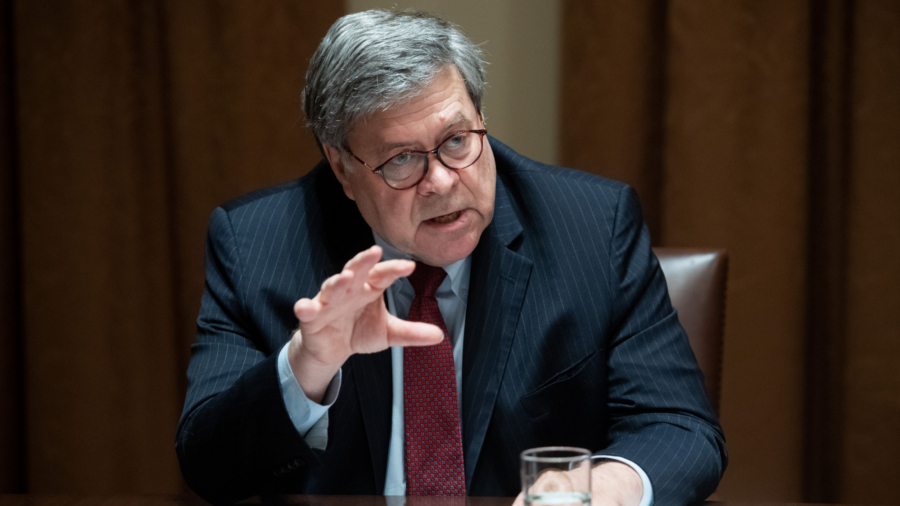A federal appeals court on Friday ordered the Department of Justice (DOJ) to release a 2019 internal memo that then-Attorney General Bill Barr had reviewed before deciding whether to prosecute then-President Donald Trump for obstruction of justice in relation to the Mueller special counsel investigation.
A panel of three judges on the U.S. Court of Appeals for the D.C. Circuit, led by Chief Judge Sri Srinivasan, came to the unanimous decision (pdf) in a case brought by the nonprofit organization Citizens for Responsibility and Ethics in Washington (CREW), a government transparency group.
“Attorney General Barr cited this memo as a reason not to charge President Trump with obstruction of justice,” CREW spokesperson Jordan Libowitz said in a statement. “The American people deserve to know what it says. Now they will.”
On Twitter, the group announced: “We won! We’re going to get the secret memo Barr used to undercut the Mueller Report and claim it was insufficient to find Trump obstructed justice. And we’re going to make it public.”
The DOJ is able to appeal the ruling to the full appeals court if it opts to do so. The DOJ did not immediately respond to a request for comment.
Judges Reject DOJ’s Argument
The memo was sent to Barr on March 24, 2019, from the head of the Justice Department’s Office of Legal Counsel and another senior department official—then-Assistant Attorney General Stephen Engel, and then-Principal Associate Deputy Attorney General Edward O’Callaghan, respectively.
Lawyers for the DOJ had argued in the case that the memo represented private deliberations of its lawyers before any formal decision on Mueller’s report was reached, and as such, they were entitled to “deliberative-process privilege” under public records law and the memo was therefore exempted from disclosure.
But U.S. District Judge Amy Berman Jackson of a lower court rejected the argument on May 3, 2021 (pdf), and ordered the DOJ to provide the memo in full to CREW.
She concluded that the memo represented “strategic, as opposed to legal advice” and would fall outside the scope of the exemption. Jackson added that the memo, which she reviewed in full in private, “reveals that the Attorney General was not then engaged in making a decision about whether the President should be charged with obstruction of justice; the fact that he would not be prosecuted was a given.”
The DOJ in late May 2021 released a redacted version of the memo (pdf) that showed only the first two pages of the document. The department also appealed Jackson’s decision.

The appeals court panel’s decision on Friday affirmed Jackson’s decision by rejecting the DOJ’s appeal, saying that “the district court did not err in granting judgment against the agency.” Similar to Jackson, the panel asserted that Barr as well as Mueller had already concluded that a sitting president could not be criminally prosecuted, and that the memo did not contain any legal analysis about whether Barr should pursue charges against Trump.
“Instead, the memorandum concerned a separate decision that had gone entirely unmentioned by the government in its submissions to the court—what, if anything, to say to Congress and the public about the Mueller Report,” Chief Judge Srinivasan, joined by Judges Judith Rogers and David Tatel, wrote in their decision.
The judges added: “The Department’s submissions in the district court gave no indication that the memorandum related to Attorney General Barr’s decision about making a public statement on the Mueller Report. Because the Department did not tie the memorandum to deliberations about the relevant decision, the Department failed to justify its reliance on the deliberative-process privilege.”
“Our decision is narrow,” they noted. “We do not call into question any of our precedents permitting agencies to withhold draft documents related to public messaging. Indeed, if the Department had identified the March 2019 memorandum’s connection to public messaging, the district court might well have sustained the Department’s reliance on the deliberative-process privilege.”
Memo to Barr
On March 24, 2019, when the memo was sent to Barr, he released a four-page summary of then-special counsel Robert Mueller’s report on the investigation into alleged collusion between the Trump campaign and Russia in the 2016 presidential election.
In the summary issued to Congress that day, Barr wrote that he and then-Deputy Attorney General Rod Rosenstein “have concluded that the evidence developed during the Special Counsel’s investigation is not sufficient to establish that the President committed an obstruction-of-justice offense.”
Barr said that he and Rosenstein had reviewed Mueller’s report and consulted with department officials including the Office of Legal Counsel before coming to their conclusion.
The DOJ released the full 448-page report a month later on April 18, 2019. Just prior to the report’s release, Barr repeated his stance at a press conference—that he and Rosenstein “concluded that the evidence developed by the special counsel is not sufficient to establish that the president committed an obstruction-of-justice offense.”
Barr also said that Mueller’s team “did not make a traditional prosecutorial judgment regarding this allegation.”
CREW on the same day filed a public records request for the information that Barr reviewed to come to his conclusion. The information included the March 2019 internal memo that Barr received. CREW also filed a request for expedition, citing strong public interest in the matter.
The DOJ rejected CREW’s request for expedited processing on April 19, 2019, saying it was “not a matter in which there exist possible questions about the government’s integrity that affect public confidence.” CREW sued in late May 2019 (pdf) under the Freedom of Information Act (FOIA) and requested that the records be immediately disclosed to the public.
The appeals court in its decision on Friday noted that during the litigation, the DOJ “produced fifty-six pages of records (with redactions) and withheld 195 pages in full,” and after some time, CREW only contested the DOJ’s withholding of two internal memos. The district court later upheld the DOJ’s withholding of one of the memos, which left only the March 2019 memo in dispute.
From The Epoch Times


